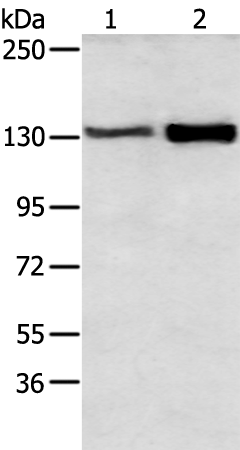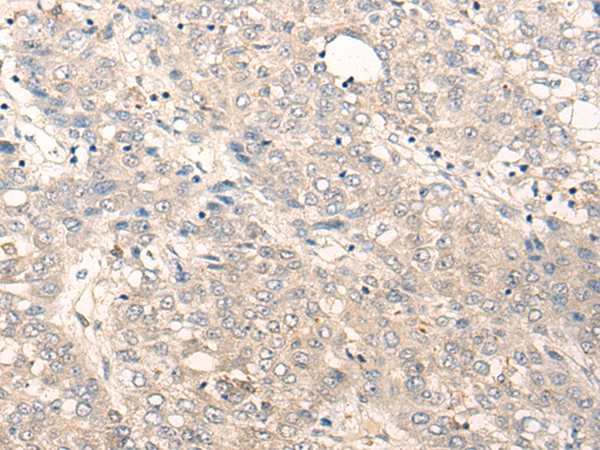

| WB | 咨询技术 | Human,Mouse,Rat |
| IF | 咨询技术 | Human,Mouse,Rat |
| IHC | 1/20-1/100 | Human,Mouse,Rat |
| ICC | 技术咨询 | Human,Mouse,Rat |
| FCM | 咨询技术 | Human,Mouse,Rat |
| Elisa | 1/5000-1/10000 | Human,Mouse,Rat |
| Aliases | PVA; CDHF6 |
| WB Predicted band size | 108 kDa |
| Host/Isotype | Rabbit IgG |
| Antibody Type | Primary antibody |
| Storage | Store at 4°C short term. Aliquot and store at -20°C long term. Avoid freeze/thaw cycles. |
| Species Reactivity | Human |
| Immunogen | Synthetic peptide of human DSG3 |
| Formulation | Purified antibody in PBS with 0.05% sodium azide and 50% glycerol. |
+ +
以下是关于DSG3抗体的3篇代表性文献及其摘要内容的简要概述:
---
1. **文献名称**:*Autoantibodies against a novel epithelial cadherin in pemphigus vulgaris, a disease of cell adhesion*
**作者**:Amagai, M., Klaus-Kovtun, V., Stanley, J.R.
**摘要**:该研究首次发现寻常型天疱疮患者血清中存在针对DSG3的自身抗体,并证实这些抗体通过破坏桥粒结构导致表皮细胞间黏附丧失。研究为理解天疱疮的发病机制奠定了基础。
---
2. **文献名称**:*The role of DSG3 in pemphigus vulgaris pathogenesis: A murine passive transfer model*
**作者**:Shuhei, Y., Payne, A.S., Stanley, J.R. et al.
**摘要**:通过构建被动转移小鼠模型,研究发现DSG3抗体单独可诱发典型的天疱疮样皮肤损伤,证实了DSG3抗体在疾病中的直接致病作用,并揭示了抗体亚型(如IgG4)与疾病严重程度的相关性。
---
3. **文献名称**:*Pathogenic anti-desmoglein 3 antibodies in pemphigus vulgaris exhibit organ-specific targeting*
**作者**:Hertl, M., Amagai, M., Bhol, K. et al.
**摘要**:该文献探讨了DSG3抗体在黏膜和皮肤中的差异性结合机制,指出抗体对DSG3与DSG1(桥粒芯蛋白1)的交叉反应可能导致临床表现的多样性(如黏膜主导型与皮肤型天疱疮)。
---
4. **文献名称**:*DSG3-specific ELISA for serological diagnosis of pemphigus vulgaris*
**作者**:Ishii, K., Yoshida, K., Stanley, J.R. et al.
**摘要**:研究开发了一种基于DSG3重组蛋白的ELISA检测方法,用于高效、特异地诊断寻常型天疱疮,并证明其敏感性和特异性优于传统免疫荧光法,推动了临床诊断的标准化。
---
这些文献涵盖了DSG3抗体的致病机制、实验模型、临床表现关联及诊断技术等关键方向,作者团队包括天疱疮研究领域的权威学者(如Amagai和Stanley)。
Desmoglein 3 (DSG3) is a transmembrane glycoprotein belonging to the desmoglein subfamily of cadherins, primarily expressed in stratified squamous epithelia, such as the skin and mucous membranes. It plays a critical role in maintaining cell-cell adhesion through desmosomes, specialized intercellular junctions that provide mechanical integrity to tissues. DSG3 interacts with other desmosomal proteins, including desmocollins, to form calcium-dependent adhesion complexes essential for epithelial stability.
DSG3 antibodies are predominantly associated with autoimmune blistering disorders, particularly pemphigus vulgaris (PV), a life-threatening condition characterized by mucocutaneous blistering. In PV, autoantibodies targeting DSG3 disrupt desmosomal adhesion, leading to acantholysis (loss of keratinocyte cohesion) and blister formation. These pathogenic antibodies are predominantly IgG-type and can directly interfere with DSG3’s adhesive function or trigger intracellular signaling pathways that destabilize desmosomes. DSG3 autoimmunity may coexist with antibodies against DSG1. another desmoglein isoform, influencing disease severity and clinical presentation (e.g., mucosal vs. cutaneous involvement).
Diagnostically, DSG3 antibodies are detected via ELISA, indirect immunofluorescence, or newer multiplex assays, aiding in PV diagnosis and monitoring. Research also explores their role in paraneoplastic pemphigus and other autoimmune conditions. Therapeutic strategies focus on immunosuppression (e.g., corticosteroids, rituximab) to reduce antibody production and inflammation. Ongoing studies aim to develop targeted therapies blocking pathogenic antibody activity or restoring DSG3-mediated adhesion.
×